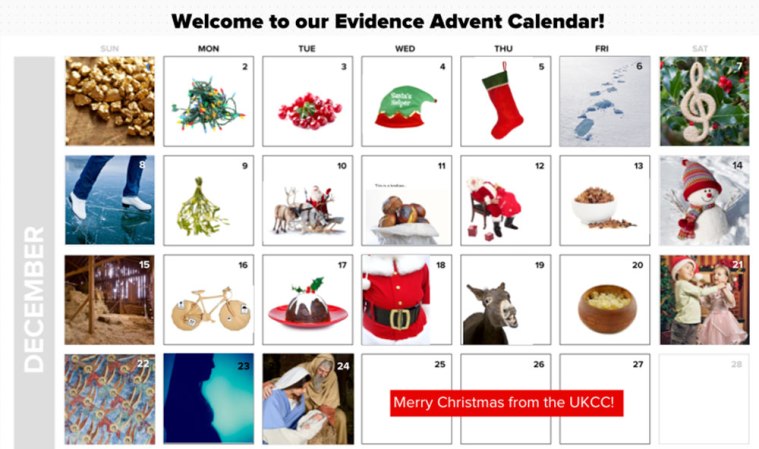Last week I gave you jellyfish, so don’t let it be said that I only go for the big health issues here! There’s a feast of new evidence in The Cochrane Library and this week, from an extensive menu, I’ve picked out a few tidbits on some more common health problems, plus some great dementia resources and a beautiful project that I want to highlight. Continue reading
Tag Archives: Cochrane Musculoskeletal Group
An evidence advent calendar!
It turns out that Cochrane’s for Christmas, not just for life, with evidence in the Cochrane Library on all manner of festive things from gold, frankincense and myrrh to stockings! Ok, some of the links are a bit tenuous, but we hope you’ll enjoy our advent calendar.
Owing to some trouble with the technology elves, we couldn’t make it interactive (boo!) but each day we’ll post some Cochrane evidence related to the day’s picture, below the calendar. If you think of any others, do share them via the comments box.

A wake-up call on children’s well-being: do more, do it now
It’s official – the Chief Medical Officer is ‘profoundly ashamed’. In her report on child health, Professor Dame Sally Davies highlights appalling inequalities in the UK, with three times as many child deaths in the poorest areas compared with wealthier regions, and shows us to be a nation lagging behind our European neighbours too. Much more needs to be done to improve the health of Britain’s children and it needs to be done sooner, she says. Early, preventive action rather than reaction will benefit both the health and the wealth of the nation. I thought I’d take a look at where Cochrane evidence might fit into her vision of what needs to be done. Continue reading
What’s the evidence on tackling fatigue in rheumatoid arthritis?
Key message: There is some evidence that physical activity and talking treatments can help people with rheumatoid arthritis manage fatigue. We don’t have enough evidence to say which elements of these types of interventions are most effective, nor whether other non-drug approaches are also helpful.
Rheumatoid arthritis (RA) is an autoimmune disease that causes inflammation of the joints. It’s the second most common type of arthritis in the UK population. Key symptoms are painful, swollen joints, but fatigue (extreme mental and/or physical tiredness) is also a problem for many people who have RA. There’s currently no cure for RA and no accepted evidence-based guidelines on how best to manage this condition. Non-pharmacological interventions, that’s alternatives to prescribed drugs such as exercise and psychotherapies or ‘talking treatments’, have been found to help people with a range of long-term conditions manage fatigue and now a new review from the Cochrane Musculoskeletal Group has looked at whether this is so for adults with RA. Continue reading
